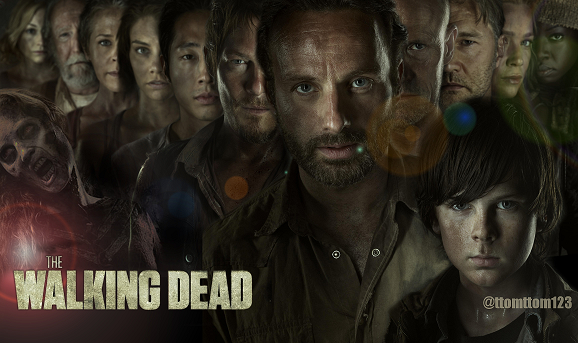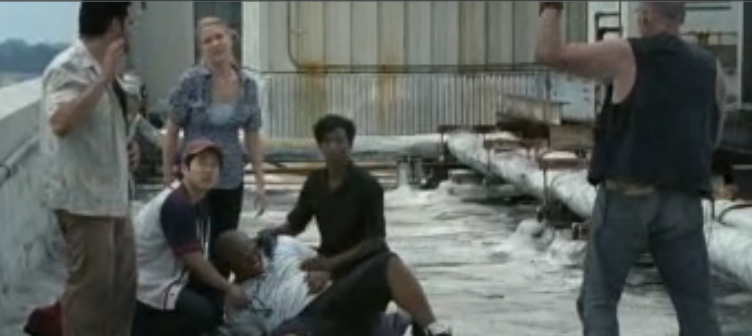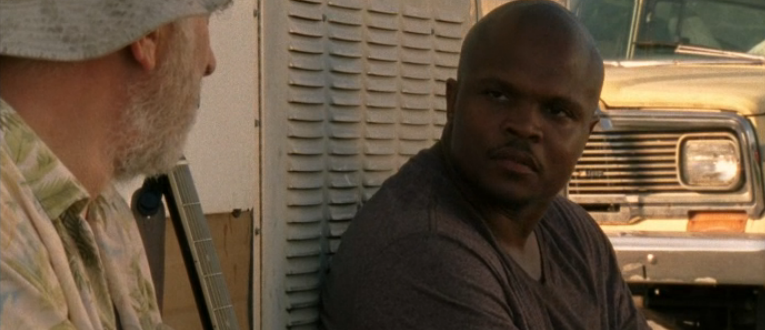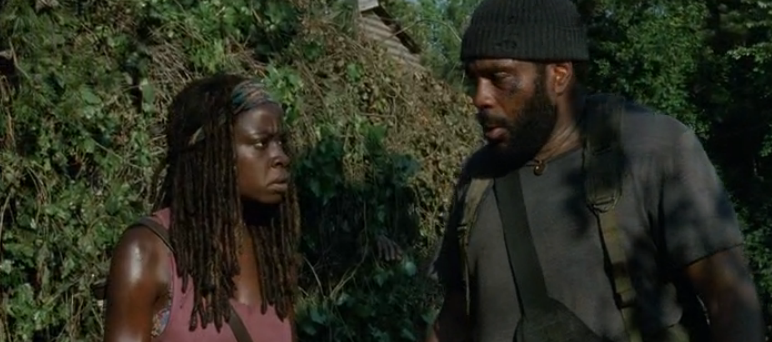Has The Walking Dead Killed the White Patriarchy?
Dawn Keetley / Lehigh University

AMC’s The Walking Dead has received a fair amount of criticism for its representation of race, perhaps best summed up in the title of Lorraine Berry’s Salon.com article, written at the conclusion of season three: “‘Walking Dead’: Still a White Patriarchy.” Far from wanting to perpetuate a world divided by racial hierarchies, however, the creators of The Walking Dead have, from the beginning, seemed intent on making their post-apocalyptic world explicitly post-racial—beyond racial categories, beyond racial oppression, and beyond white privilege and power.
Rick Grimes voices this utopian aspiration in the second episode of the first season. Trapped on the roof of a building in Atlanta, surrounded by zombies, the survivors erupt into racial conflict, as the white Merle Dixon flings racial epithets at Hispanic and African-American characters and declares himself their de facto leader. When the inevitable fight ensues, Rick intervenes, beating and handcuffing Merle and declaring: “Things are different now. There are no niggers anymore, no dumb-as-shit-white-trash fools either. Only dark meat and white meat. There’s us and the dead” (“Guts”). Essential differences, theorized for centuries in terms of race, are displaced onto the absolute divide between “us and the dead.” From this point on, The Walking Dead seeks to imagine what it means to inhabit a post-racial world.

At first, alarmingly, this post-racial experiment seems less to usher in the disappearance of race than the disappearance of non-white characters. In fact, the post-racial, post-apocalyptic world ends up looking a lot like, well, the white patriarchy. African-American characters Morgan Jones and his son Duane help Rick survive his awakening to the apocalypse in the first episode of the series, but are then left behind as Rick moves on. The Morales family, a part of the original group of survivors, drives off to find family members in Alabama, and they aren’t seen again. The only African-American female character in the first two seasons, Jacqui, is not developed at all, has virtually no lines, and then chooses to immolate herself in Dr. Jenner’s destruction of the CDC in the season one finale.
Most notoriously, the series seemed unable, through the end of season three, to countenance more than one African-American male character at a time: after Morgan, there was T-Dog, who dies soon after the group discovers Oscar at the prison in season three. And once Tyreese appeared mid-way through season three, it surprised no one when Oscar was killed in a scuffle at Woodbury. T-Dog’s words from the second season episode “Bloodletting” are uncannily prophetic. Feverish from an infected wound, T-Dog says to Dale: “I’m the one black guy. Realize how precarious that makes my situation?” Precarious indeed. While T-Dog is worried about getting “lynched” in a world ruled by “two good-old-boy-sheriff-cowboys” and a “redneck,” he is in fact killed by the inexorable one-black-male-at-a-time logic of the series. Meanwhile, white men—Rick, Shane, Dale, Hershel, Daryl, the Governor—vie for leadership of the group. As Lorraine Berry writes, “white men have closed ranks and cemented their power.”

Despite obvious missteps, though, the writers of The Walking Dead have remained committed to their vision of the post-apocalypse as post-racial. Season three showed some signs they were succeeding, and season four has shown even more. Introduced in season three, Michonne has come into her own as a strong, central character. The same is true of Tyreese and his sister, Sasha, as well as former army medic, Bob. The series is emerging from tokenism, evidenced by the fact that in season four the survivors are ruled not by a white male patriarch (Rick) but are guided by a council that includes white, black, and Asian characters, women and men, old and young.
While the new post-racial world of The Walking Dead no longer erases people of color, it does, perhaps by definition, demand a studied indifference to racial identity. Virtually no reference is ever made by others or by themselves to the fact that Michonne, Tyreese, Sasha, and Bob are African American (or that anyone else is of a particular race). Race-thinking, when it infrequently happens, is represented as pathological. The first and only time T-Dog talks about race—“I’m the one black guy,” ruled by “good-old-boys” and “rednecks”—is when he’s sick, and his comment prompts Dale to worry that he has “gone off the deep end” and needs medicine fast. Alternately, race-thinking is the purview of the openly racist Merle—the only character who seems unable to let race go. In Merle’s case, his racism is part of his self-destructive, impulsive behavior, which he explains to Rick by saying, helpfully: “I don’t know why I do the things I do,” including, presumably, his insistence on calling Glenn a “Chinaman” (though he knows he’s Korean). Merle is the only person to remark on Michonne’s race, pointing out that it’s “ironic” that she has two chained zombie “slaves.” If T-Dog symptomizes race-thinking as a febrile hallucination, Merle manifests it as an unexamined reflex, an unthinking holdover from a past that’s now irrelevant.
In the world of The Walking Dead, race must be “let go.” The season four episode, “Indifference,” allegorizes this impetus. As Bob says early in the episode: “It helps to keep moving.” Daryl, Michonne, Tyreese, and Bob are on a run to find medicine. During the course of the episode, all three black characters are explicitly urged to “let go” of something. Devastated by grief and anger over the murder of his girlfriend, Tyreese hacks furiously at some vines and then holds onto the walker that lunges out at him. Michonne and Daryl yell at him to “Let go,” but he won’t, and Michonne confronts him later, asking him “Why the hell didn’t you let go?”, adding, “You should have let go.” Later in the episode, Bob almost falls off a roof and walkers grab at his bag. Again, Michonne yells, “Bob, let it go”; Tyreese shouts “Let it go. Let it go,” and Daryl says, “Let go of the bag, man.” And through her conversations with Daryl, Michonne learns, finally, to “let go” of her obsession with the Governor—realizing she needs to relinquish her anger and need for revenge in order to become part of the group.
[youtube]http://www.youtube.com/watch?v=06LhX2gWqOM[/youtube]
While the things that Michonne, Tyreese, and Bob need to “let go” of are on one level, of course, specific to their stories within the series, the multiple explicit repetitions that they each “let go” also work, I argue, to signal The Walking Dead’s notion of what a post-racial world entails. It requires “letting go” of the past, along with the anger and the desire for redress that can animate memories of the racial past in particular. “Anger gets you killed,” Michonne says to Tyreese. Anger also isolates you, as it does to Michonne in her constant forays out of the prison in search of the Governor. Anger is represented as a dangerous compulsion, an unconscious holdover from the past (as symbolized by the alcohol Bob holds onto, despite himself). Bob tells Daryl, significantly, about having been “the last one standing” in two separate groups of survivors—and that he was “done being a witness.” Daryl tells him, “No need to be standing alone—not no more.” All three black characters are urged to “let go” of the past—of anger, grief, the desire for reparation, the need to be a “witness” to suffering. They are invited into the group—the new group, the only group that matters: “us” standing against “the dead.” Survival, belonging, the post-racial community, come at the expense of history. They demand to be “let go.”

In her critique of The Walking Dead, Lorraine Berry demonstrates precisely this unwillingness to “let go” of the past which is so inimical to The Walking Dead (and its fans). She raised the ire of many readers by interpreting Michonne through the lens of history, arguing that when the Governor tells Rick he won’t attack the prison if Rick turns Michonne over to him, Michonne was being treated as property, as currency, in a battle between white men—that the series thus evoked both slavery and lynching (at one point Merle puts a hood over her head). Numerous comments on the article vehemently disagreed with this reading, arguing that Michonne was, as one writer succinctly put it, simply “bad ass.” Michonne had evoked the Governor’s fury by being smart enough to see him for who he really was and for killing his (zombie) daughter and blinding him. Michonne becomes the Governor’s nemesis because of her intelligence and strength. She is not a “bargaining chip” between two white men. She is nobody’s property, nobody’s slave, nobody’s victim.
What The Walking Dead recognizes is that in this new post-racial world history can’t just be relinquished; it needs to be re-written. There must be a new narrative. The Walking Dead fills the vacuum of history with something else: white meat and dark meat, the living and the dead—and the weak and the “bad ass.”
Image Credits:
1. Promo
2. Merle
3. T-Dog and Dale
4. Michonne and Tyreese
Please feel free to comment.
With the return of The Walking Dead’s season four return this week, I thought it would be appropriate to talk about one of TVs most watched, and talked about shows since it’s initial release in 2010. Dawn Keetley, author of “Has The Walking Dead Killed the White Patriarchy,” writes a response to Lorraine Berry’s Salon.com article, “Walking Dead: Still a White Patriarchy” and touches on the topic of African American characters throughout this “post-racial” zombie apocalypse. Characters that are African American do become major characters with building character arcs. Michonne, Sasha, Tyreese, Bob all become developed characters that according to this article “letting go” relinquishing the past and restoring humanity.
Keetley talks about how from season one up until this recent season has been dominated by white superiority. In season one we are introduced to Morgan, who saves Rick, and his son Duane, Jacqi, and T-Dogg. We see Morgan and Duane for one brief episode and don’t hear from them again and Jacqui plays a very little part with no dialogue and brings zero to the group. Then T-Dogg on the other hand, is a non-factor when it comes amongst power between Rick, Shane, Daryl, Dale, and then eventually Hershel. Until his heroic sacrifice in season three, T-Dogg doesn’t play a factor in the story plot elements. He does however recognize the world that he is surviving in, or lack there of. He is the one black guy with two cops in charge. He is out of his element. Until the major four African American characters we have now, the show made it clear that there was only room for one character of color.
A point that I think really connects the white patriarchy to this certain show is in season 3. Impeding a major battle, the Governor and Rick talk an exchange for Michonne and there wont be a fight. They’re discussing the trading of property, putting a price on women, a black woman at that. But Michonne has grown to be a very smart intelligent, and strong both mentally and physically. This was episodes before the season finale and I think one could connect it to the trading of slaves. The show is much more of a human survival drama than that of a zombie action show. Dealing with racism in a very real way. With this present day town living in a prison, a counsel of leaders is consisted of white, black, Asian, young, old, Hispanic, men, women, it’s not just Rick, or Shane, or Hershel making supreme choices that affect the entire group.
Racial issues within this newly constructed world isn’t just brushed away and put off, its dealt with a new manner that allows its own narrative, its own set of rules between those willing to work to survive, the weak, and the “badass.” Season four should introduce new problems for the now split up group.
Why does everything have to be race-based and not just a drama!? What in the hell….nice article for some waste of time ooooh good to know there are black people/African Americans/people of color in this series. Thank you. Do you care to further discuss any other points other than race? Perhaps quAlity of filming or setting, plot, diction or speech? Nope just ravage on the race card. How about I quote Dave Chappelle “or Here is another idea that could be quite controversial you could shut the fuck up”
In addition to Rick leaving, the fact that TWD has now pandered to everything you’ve groused about in this article to the point of the cast of characters being so all over the map that I cared for precious few of them, I left the show a good while back.